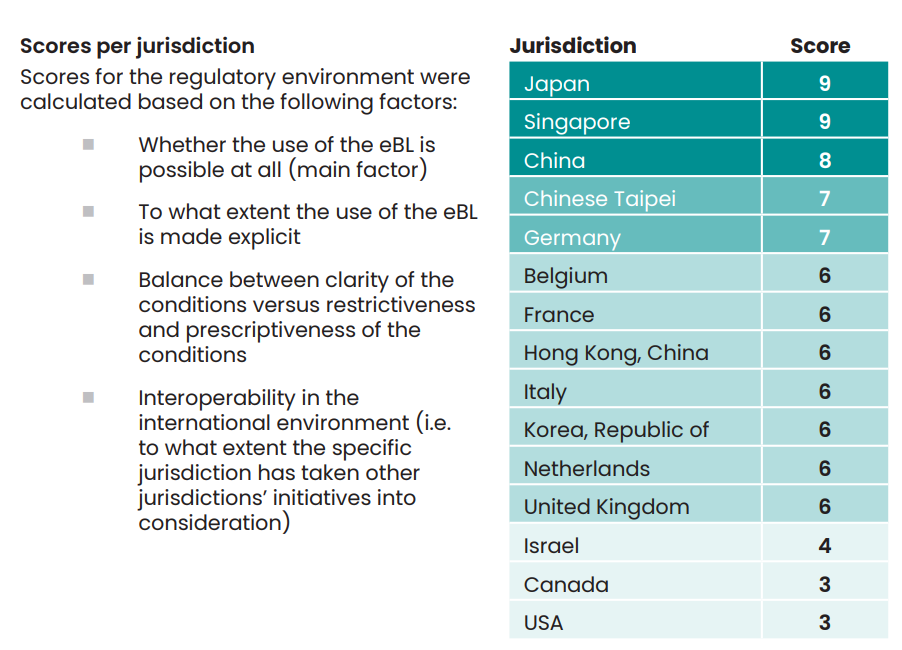Digital Container Shipping Association (DCSA) has released a report which explores legal and regulatory barriers to electronic Bill of Lading (eBL) adoption.
The DCSA Legal and Regulatory Barriers Report analyzes national legal frameworks across 15 countries, representing a significant portion of global trade. It focuses on uncovering obstacles to full electronic Bills of Lading (eBLs) adoption by 2030 and strategies to overcome them.
As informed, the commitment of the Digital Container Shipping Association (DCSA) and its nine ocean carrier members to achieve 100% eBL adoption by 2030 highlights potential cost savings and sustainability benefits.
A number of barriers to achieving 100% eBL remain and not all of these can be addressed by the industry itself. Notably, legislation and government procedures can complicate or even prevent the use of the eBL.
…DCSA stated
With support of the international law firm Baker McKenzie, DCSA conducted research to pinpoint legal and regulatory barriers from a broad perspective. According to DCSA, the purpose of the report is to identify the legal and regulatory barriers and best practices in order to achieve DCSA’s 100% electronic bill of lading (eBL) adoption by 2030. It provides specific recommendations for legislators and governments on how to overcome these barriers to accelerate digitalisation across global trade.
According to the research, the use of the eBL is possible in all surveyed jurisdictions. However, different barriers in different areas are still in place, leading to uncertainty.
The good news is that huge momentum in trade digitalisation is apparent in these jurisdictions, and a lot of existing barriers are being addressed, either through legal reform, regulatory changes or international initiatives being implemented.
Regulatory environment on eBL adoption across the world
As the research shows, in some jurisdictions, eBLs are not accepted as a matter of law in case of commercial disputes. In others, there are elaborate requirements that must be met to validate an eBL, leading to a possible negative business case when compared with paper. In many cases, while the use of an eBL might be possible, it is not explicitly mentioned in legislation.
In addition to presenting issues in a commercial context, government bodies such as customs, tax and transport authorities rely on the BL and its contents for proof of compliance with a wide range of rules and regulations, which further compounds legal complexities, the organization further noted.

In the regulatory environment, Japan, Singapore and China have the best practices. The eBL can be fully used under clear conditions, without being very restrictive or prescriptive. Their requirements also seem well aligned with international standards. Chinese Taipei and Germany have good scores, but there are still challenges in practice as a government official can ask for a paper BL, despite the electronic version being legally acceptable.
In Belgium, France, Hong Kong, Italy, the Netherlands and the United Kingdom, electronic is accepted, but this is generally through semi-digitalisation, i.e. the presentation of a digital copy of a paper document. In some of these jurisdictions, government officials may also still request an original paper document, although this has become increasingly rare. In Korea, there seems to be an obligation to submit documents and data through certified agents instead of directly to customs. This also means that the provision of documents and data is likely reliant on the requirements of those agents.
Canada and the United States have a low score as there are still regulatory requirements that necessitate the use of paper. However, these requirements seem to be legacy issues. If they are resolved, the United States would be one of the highest scoring jurisdictions due to its global best practices. Israel in general has a lower level of digitalisation than the other jurisdictions covered in the research due to lower trade volumes and thus also holds less relevance in this area.
Barriers and opportunities
Furthermore, the report identifies also barriers and offers recommendations for stakeholders to engage in digitalization, leveraging existing solutions and advocating for necessary legal reforms to maximize eBLs’ potential in global trade.
To some degree, most jurisdictions in the world have barriers that must be overcome. In order to achieve 100% eBL adoption, laws and procedures that prevent the use of the eBL must be identified and addressed.
In an exclusive interview to SAFETY4SEA, Bertrand Chen, CEO of GSBN, discussed the benefits of eBL, saying that 99% of Bill of Lading documents are still paper-based, with 45 million of such documents couriered around the world to ensure shipments can keep moving. An eBL can harness the immutable nature of blockchain to preserve the advantages offered by physical paper, as well as the trust-by-design of the technology.
In any case, solutions for the use of the eBL are already in place today. DCSA sees these solutions, together with the legal atmosphere and reform undergone in several jurisdictions, as complimentary. Therefore, DCSA urges stakeholders involved in trade not to wait for legal reform or for a certain barrier to be solved, but rather to join the eBL and trade digitalisation movement





























































